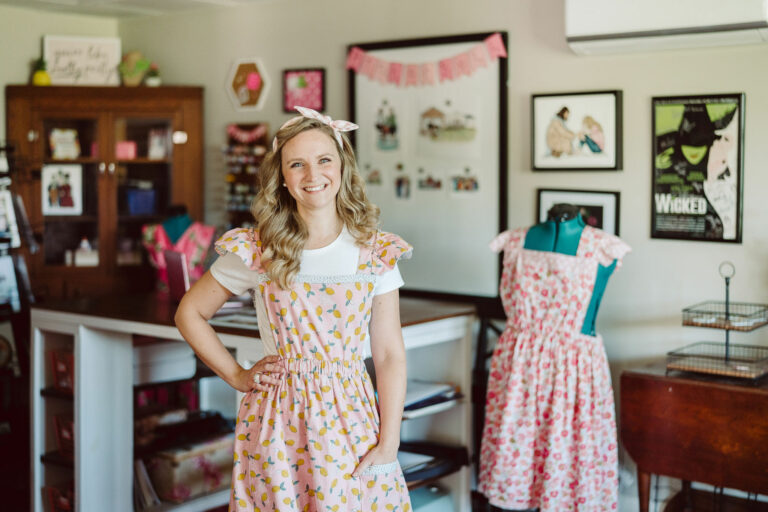Education Matters
Hear the Voices of Local Teachers
WRITTEN BY: SAMANTHA SHOVER | PILLAR OF FAMILY | ISSUE 08

As the world hurtles forward into the uncharted realms of the future, so does the landscape of education. In this dynamic era of technological innovations, shifting social norms, and evolving learning paradigms, the role of teachers has never been more vital. Welcoming students into the bright dawn of the 21st century requires educators who can navigate the complexities of modern life and inspire the minds that will shape tomorrow.
In 2023, teaching has undergone profound transformations, and the voices of educators echo through the corridors of change, resonating with the truth of their experiences. These voices, seasoned by challenges and triumphs alike, offer us an unfiltered glimpse into the realities of classrooms in our direct area.
Join us as we listen intently to the voices of teachers who have embraced the call of education in this transformative age. Together, we will uncover the truths that lie at the heart of modern teaching, dispelling myths and celebrating the unsung heroes who tirelessly light the way for generations to come.
These are the voices of multiple anonymous local teachers that have candidly answered our questions in regard to today’s norms in the education field…
INTERVIEWS WITH 5 LOCAL TEACHERS:
SAM: What is a misconception you had about teaching?
TEACHER 1: “Teachers get their summers off. Yes, we do not have to physically go to work 5 days a week in the summer however we do not fully get our summers off. During the summer months, I am planning lessons and activities for the next year, shopping for supplies for my classroom, attending professional development opportunities, and going into the school building to prepare my classroom for the next year. I was not aware of how much work teachers put in during the summer months and their non-contracted hours.”
TEACHER 2: “That it would be easy. People think you just go and play all day. One of the hardest parts of teaching is making sure all kiddos feel safe, full, and ready to learn. You don’t really think of that going into it, but it is a huge part of the job. Students cannot learn unless these needs are met first. Teachers wear many hats.”
TEACHER 3: “I never knew or realized how bad the parents would or could be to teachers. The way parents trust their child’s teacher is VERY different nowadays. When I was in elementary school, my parents knew everything that happened at school, I would be disciplined, and knew better next time. In today’s classrooms, parents are constantly questioning teachers with how they run THEIR classrooms because their child went home and lied. I have sat in on many parent teacher conferences because the teacher did not want to be alone with the parent.”
TEACHER 4: “I think I expected participation from the parents to be more in the care and support for their child. Sometimes I feel like I’m the only one in children’s lives that think their education is important. I’ve had parents that blocked the schools phone number, so that you can’t call them.”
TEACHER 5: “I did not anticipate how close I would get to the kids. I landed in middle school math. Math was the thing I thought I would like the least. I liked it the most because I would try to find ways to make them want to be in my classroom. I am going to cry because I miss teaching every day. Like some days, I can’t even drive toward the school in the mornings.”
“My biggest goal each school year is to make sure every single one of my students knows they are loved and capable.”
– TEACHER 1
How can pet owners protect their furry friends from overheating in hot weather?
TEACHER 1: “My first year teaching was the year before Covid. Most people say your first year is your hardest however that was not the case for me. Now looking back, Covid really has brought out some bigger issues in the education setting. Many students have developed large learning gaps due to not physically being in a classroom. Many students were virtual learners who completed lessons on the computer or students came to school in a hybrid format- attending twice a week. This loss in learning has had lasting impacts that teachers are having to work really hard to try and close previous years of learning gaps while still teaching the grade level content they are required to teach for standardized tests.”
TEACHER 2: “I think the biggest difference in pre versus post COVID is the mentality of EVERYONE. People got used to being home, not doing much and were also under a considerable amount of stress from the uncertainty. Students have a little less grit and parents coddle a little more. It is hard to come out of a mentality like that.”
TEACHER 3: “Effort, accountability and respect. That has probably been the biggest difference between before and after COVID. Before COVID, students knew their roles and responsibilities in the classroom. They typically did not question the teacher or be disrespectful. They put in the time and effort. During COVID, we had to teach through a camera and be creative to get through with minimal training or preparedness. Stamina and motivation is the biggest difference.”
TEACHER 4: “I think the biggest difference in pre versus post COVID is the mentality of EVERYONE. People got used to being home, not doing much and were also under a considerable amount of stress from the uncertainty. Students have a little less grit and parents coddle a little more. It is hard to come out of a mentality like that.”
TEACHER 5: “It was really hard to only see your students twice a week. They were not prepared to work from home. They had never been taught to do the things we were asking them to do: to log on to a computer to be dedicated to doing their lessons, to learning on their own in some ways. You could see there were gaps. I taught seventh grade math my last year, and I went back and re taught a lot of the sixth grade math, because I knew they didn’t have that basis because of the pandemic.”
SAM: How do you deal with burnout as a teacher? Can you speak to mental health within the teaching profession?
TEACHER 1: “With increased behavioral issues and added stress, I have experienced burnout a lot lately. I have found that the easiest way for me to overcome some of these negative feelings is to talk to other teachers that feel the same way. Teachers relationships with each other is essential to me in this challenging job. Venting to others about my day has helped me realize that I am not at all alone in feeling burnout. In my personal opinion, I feel that teacher mental health is swept under the rug in this profession. We are constantly learning about student mental health and attending professional developments on how to help foster positive mental health for students but, there is not support or easily accessible resources in the school system for teachers. I feel in order to help our students with their mental health, we must be able to have help with our mental health as well. I believe that purposeful mental health for teachers is crucial in keeping teachers in their profession.”
TEACHER 2: “It is tough at the end of the school year when everyone is ready to be done. For me, I do not work in the summer as that is my time to reset. I always know that my time is coming and I take full advantage, spending as much time outside and with my children as I can. The weeks during the school year are very hectic, so slowing down is much needed. My mental health has gone up and down throughout the years as a teacher. Before, during, and right after the pandemic, I was very worried about test scores. The year after the pandemic, the scores for our class were not great. I had been putting (sometimes unreasonable) pressure and stress on myself to do well on the tests. Now, I do my best and know that is good enough and it is very liberating! If I hadn’t come to this point, I would be way more stressed and probably burnout more quickly. I do my best to teach the kids academics and do what I know is best for the kids (not always a test score).”
TEACHER 3: “There is very little support for burnout and mental health for teachers. For myself, I had to set a lot of boundaries or my “work-life” would spill over into my “home-life.” I do not work outside my contract hours of 7:30-3:00. I do not arrive early or stay late. If I am unable to finish something during my planning period, I pick it back up the next day. I no longer take my computer home on the weekends and I don’t check my emails after 3:00. As a teacher, you have to fully disconnect when you step out of the school building. Sometimes I have to drive home with no music playing just to get 15 minutes of silence and reset. I feel that central offices and administrators really “think” they are supporting teachers’ mental health, but in-reality it is more so gaslighting what we really need. Jean days, Workout Wednesdays, random ice-cream orders or coffee trucks do not help teachers mentally. Sure, we absolutely appreciate it and are grateful for thoughtfulness that comes behind it, but what does it really do for our mental health? I should not have to take a “sick day” and place in the comments “mental health” to get a break, to set my mind at ease so that my students can have 110% of me to teach them.”
TEACHER 4: “I try to deal with burnout as a teacher by being kinder to myself than maybe I was as a new teacher. I do not bring work home nearly as much. I pick what assignments get graded and put in the grade book and which ones are just practice. If I am not given enough time during the day to get everything to absolute perfection, I do not take that out on myself. I take a step back and think my job is done, and the students are cared for and taught thoughtfully. I just can’t kill myself to be perfect anymore (it also just doesn’t feel appreciated and the kids complain either way whether it took you 20 mins or 2 hours to set up a lesson). In regard to mental health, it is really low in the profession right now. The pay to work ratio isn’t great and a lot of people are leaving. This makes classes bigger and there are not as many seasoned teachers because people leave. A lot of my friends have or want to leave the classroom setting and I would be lying if I said I haven’t thought about it too. I am hoping that things will be back to more normal (or closer to when I started) soon because I know I will not make it to year 30 if there are no improvements.”
TEACHER 5: “I think they’re asked to do more than they have been in the past. I think kids’ social skills and their study habits are not where they were. You know, the last few years I taught, I didn’t assign homework. You don’t know what they’re facing when they go home. If they’re worried about IF they are going to have dinner that night, I did not want them to worry about 15 math problems. As far as burnout, I think I would have to have felt it to know, and I didn’t. I’m glad that I left teaching when I didn’t feel that way. COVID had nothing to do with me leaving teaching either and the kids certainly didn’t. I just needed more income to support my family. The thought of not being in the classroom, kept me there longer. Every day, I’d go in and I might say ‘okay, this should be my last year,’ and then I’d go in and I’d see my kids and think, ‘no, I can’t do it. You know, I gotta be here.’ So COVID had nothing to do with that decision.”
SAM: What brings you joy as a teacher?
TEACHER 1: “The most rewarding thing about teaching to me, is the relationships I have built with my students. I enjoy getting to know them, attending their outside extra curricular activities, and building relationships with their parents. It’s so special when past students still give you hugs or communicate with you even after they have been in your class. My biggest goal each school year is to make sure every single one of my students knows they are loved and capable. Another thing that brings me joy in teaching is being able to teach a subject that I feel strongly about and making it fun for all students. For many, math can be challenging and difficult and a lot of students lack confidence in their mathematical abilities. For me, I enjoy room transformations and bringing math to life with hands-on experiences and high engaging activities. I enjoy dressing up silly and wearing things to school that are unique and fun!”
TEACHER 2: “I love when I get really close to a student or group of students. I have had two girls (one last year and one this year) that hated math and now they love it. I love to see kids learning and enjoying it. I also usually get the pretty big behavior kids. It makes me so proud when they can learn how to manage big emotions and be kind to others.”
TEACHER 3: “In all honesty, the students do. I attend a lot of extracurricular activities to support the students outside the classroom. I decorate my door and window each month. I am using my own money and time, but the happiness and joy it brings to the students makes each day better and easier to face. We are silly together. You cannot be serious 24/7 with your students. You are going to make mistakes as a teacher, your students are going to make mistakes, and you are going to have hard, tough days. Sometimes those days call for more silly time and games to bring an ease of an environment in the classroom.”
TEACHER 4: “The kids bring me joy. The kids who want to be there are obviously easier to build relationships with at first and supporting their learning is the initial joy in a school year. However there is really something special about having a kid who is not super into school warm up to you and be successful. Even though SOLs are the literal worst, some of my favorite moments have been students who have never passed an SOL pass for me and finally feel like they are smart/successful and have made it. Conversely the worst moments are when you have kids who you know tried so hard, fail, and be so defeated.”
TEACHER 5: “I loved the relationships with the kids. I just really enjoyed being with them! It’s cool to be able to make an impact in their life.”
SAM: What is something that could be changed within the teaching profession that could make a big difference for teachers?
TEACHER 1: “Above all, I believe something needs to be done about teacher pay. The amount of work teachers do outside of contract hours that is uncompensated is immense. Teachers struggle to provide for their families off of a teacher wage. In order to make teachers stay in this profession longer, I feel they need to be compensated for the work they are doing. Without my husband and a second job, I would not be able to provide for my son and I. It is really sad that many teachers decide to quit because the pay is not worth it. Teachers have to quit because its cheaper for them to quit then to pay for childcare. This has to change, something has to be done in order to pay teachers adequately like they deserve.”
TEACHER 2: “Our district is putting a lot of training on us, and it is not necessarily what we need. The district needs to stop micro managing and putting more demands on us than we already have. Their goal right now should be retaining teachers and making sure they have everything they need to get the job done. We are trained professionals and should be treated as such. No one would complain about more money either. People want their kids to go to good schools but no one wants to pay for it. Small class sizes are a must, especially K-2, but the opposite is happening.”
TEACHER 3: “Better student behaviors and respect towards teachers would be a game changer. We are not babysitters, and we are trying to help children learn in multiple ways at the same time. Actual consequences for bad behaviors would be great to reduce class disruptions, and limit bad behaviors. MORE TIME to plan is much needed!!! Smaller class sizes would tremendously help. An actual salary to live on that does not require one to need a second or third job to make ends meet would be wonderful. Legislation should be written in such a way that puts academic education first for children who want to learn. When there is no recourse for families whose children terrorize classrooms with their extreme behavioral issues when no IEP is in place, something has to change. Parenting has changed dramatically over the last 7 years and families are not held responsible for the disrespectful and dangerous behavior of their children. Administration has very little ability to help, and legislation is written in such a way that suspending children is very difficult and takes an extremely long time. There has to be weeks and weeks of data to be even considered. Meanwhile, all other students lose weeks of instructional time and feel great fear when coming to school. This should be considered, and school safety should come first.”
TEACHER 4: “I think trusting teachers to teach without constant testing and criticism would be really helpful. Part of this would also require proper funding so we can have proper supplies (without buying them ourselves) and staffing so we have manageable class sizes. It almost constantly feels like we are being judged/blamed for the results of poor support/funding.”
TEACHER 5: “Parents just checking on their kids and saying, ‘show me what you did today.’ I think a lot of parents are just so overworked, that they don’t have time to focus on that, but I think just a few minutes a day could help.”
In gratitude to the teachers who shared their stories with us and we stand in hope for the transformative future that lies ahead.
As we draw the curtain on the candid revelations of our local teachers, a remarkable tapestry of insights emerges. Through their unfiltered narratives, we learn that misconceptions abound in the realm of education, debunked by the realities of classroom experiences. The seismic impact of the COVID-19 pandemic is undeniable, altering the very fabric of teaching, reshaping the interactions with students, parents, and administration. The metamorphosis from teaching before and after COVID has been profound. Once confined within classroom walls, education now transcends physical boundaries through virtual learning. Yet, the soul of teaching remains constant, ignited by the passion of dedicated educators, yearning to impart knowledge and nourish young minds.
Before the pandemic, the faces of children beamed with innocence and curiosity, but COVID instigated shifts in their demeanor. The toll of uncertainty weighed on their young hearts, reflecting a profound need for emotional support. Simultaneously, parents assumed newfound roles as co-teachers and allies, forging stronger partnerships with educators, fostering a deeper understanding of their child’s educational journey.
The specter of burnout cast a shadow over teachers, demanding robust coping mechanisms. From professional development programs to fostering a culture of self-care, educators discovered strategies to rejuvenate their spirits. Moreover, acknowledging mental health within the teaching profession emerged as a crucial facet of preserving the well-being of those entrusted with shaping young lives. Yet, within these illuminating voices lie the call for change. To foster lasting transformation in the teaching profession, we must advocate for reduced teacher burdens, allowing teachers to focus on their true passion: educating young minds. Elevating teacher voices in decision-making processes, implementing more supportive classroom resources, higher pay, and investing in comprehensive mental health support can make a significant difference for educators.






